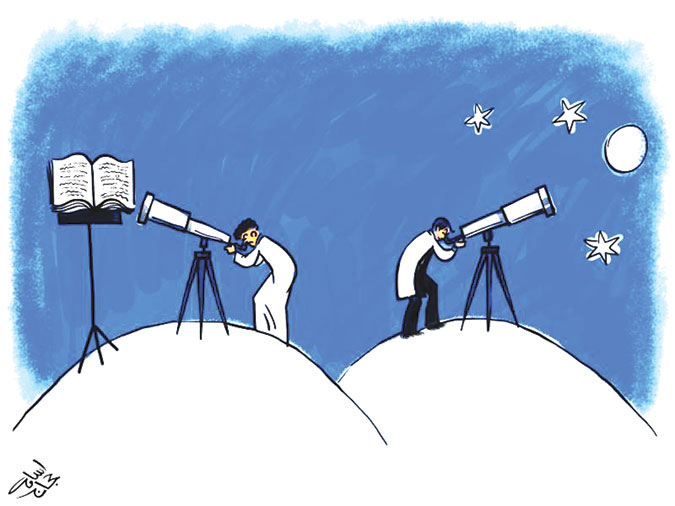
The vast majority of people worldwide, and the vast majority of Americans, do not believe the universe is 13.8 billion years old, nor that our planet is 4.5 billion years old. Nor do they believe that every speck and scrap of life on this planet, in all its incredible diversity, has evolved over the last 3.5 billion years.
From the microscopic archaea who thrive only in extreme environments like volcanoes where other organisms cannot survive, to the great blue whales who are the largest creatures ever to have existed in the history of life on earth; from the mayfly who gets a dawn’s birth and a dusk’s death, dancing in the air only for one single day’s ballet, to the statuesque bristlecone pines whose ancient gnarled silhouettes stand witness to 5,000 years of humanity’s history of civilization, almost everyone believes them to be special creations of a divine, supernatural artist.
They do not believe that life’s sheer breadth and complexity, in all its awe-inspiring range, evolved blindly, and naturally … all of it from a simple, shared, beginning ancestor. But you and I do. This is because our understanding of ourselves and our place in the universe is informed by science, resulting in what we might call the “scientific worldview”. “The scientific worldview is grounded in the real world … the normal and natural world… as opposed to an imagined supernatural or paranormal world.
It prizes empirical evidence and reasoning as the best way of truly understanding this natural world and our place in it. If we are curious about the actual nature of the universe, the birth of star clusters, and the silence of fading supernovae, physics and astronomy are our guides. Should we seek to understand the processes that shaped our planet’s birth, or the powerful and unrelenting forces that over eons sculpted majestic mountains, chiseled deep canyons, and spread the vast and silent deserts, we turn to geology. If we wish to know about where life here came from in all its breathtaking variety, and how we look to biology.

If we want to learn why people are the way they are, or if we have central questions like how we might become happier and healthier humans, we seek answers from the medical, psychological, and behavioral sciences. We do not leaf through the pages of aged religious texts for these answers. Because they are lacking. Indeed, the scientific worldview shines like a bright beacon of reality in contrast to the shadowed caverns of superstition and the dogmatic sanctuaries of religion, both of which require leaps of faith into the darkness rather than confident steps forward guided by the light of evidence and reason.
Unlike religious or supernatural worldviews, which fundamentally rely on faith, idiosyncratic personal experiences immune to investigation, and outmoded ancient traditions as sources of “truth,” the worldview of science adheres jubilantly to the principles of scientific inquiry and is steeped in the commitment to change our minds when the evidence compels us.
Where religion and superstition attribute completely natural phenomena to divine, mystical, or occult causes, the worldview of science reveals physical, testable explanations. And unlike religion and superstition, which ask us to simply accept their tenets without asking the ‘how’ and ‘why,’ science calls us to play, to wonder, to question, and to thirst after knowledge of the real world, even often revising our assumptions in the process. The scientific worldview doesn’t demand fixed and unchanging belief but invites open-minded and flexible curiosity. While some might argue that religion or superstition can uniquely offer hope and succor when facing the brute facticity of our impending deaths, it is actually the scientific worldview that is deeply life-affirming.
While it does not offer us the comforting certainties and false promises of the transcendent, what it does provide us is quite enough: the chance to be active participants in the quest for knowledge of the world and of ourselves, rather than being passive recipients of predefined and insufficient answers… ancient and outmoded “best guesses” … developed by itinerant pre-scientific nomads of crumbled civilizations. The scientific worldview tells us we are part of a great cosmic ballet, our forms and movements dictated by the atomic choreography of the literal star stuff comprising us, a poetic fact that is both humbling and inspiring. It shows us that we are interconnected to everything in this wondrous, blossoming, unfathomably old Universe.

It provides a potent antidote to the distractions of supernatural belief, affirming that our existence, though ultimately insignificant and accidental, is for our brief time meaningful as a sublime part of an immense and increasingly comprehensible cosmos. The scientific worldview drives us to continually question, explore, and learn. This drive for knowledge and discovery is what has propelled all human progress, especially over the last century, including the remarkable progress that humanity has achieved when it comes to our increased life expectancies and improved quality of life by nearly every measure.
By refusing to reduce the beauty of our existence to some temporary waiting room to spend time in until we are permitted to travel to some far-off heavenly realm after death, the scientific worldview enhances our appreciation of this natural world here and now and motivates us to refashion and even improve it, in light of our very human needs and interests. The scientific worldview is a hymn we sing about our beautiful lives in this real world. It invites us to reach out, resonating with the strings of the very cosmos, marveling at the grand symphony that is our existence, adding to it our own fleeting melody.
Leave a Reply